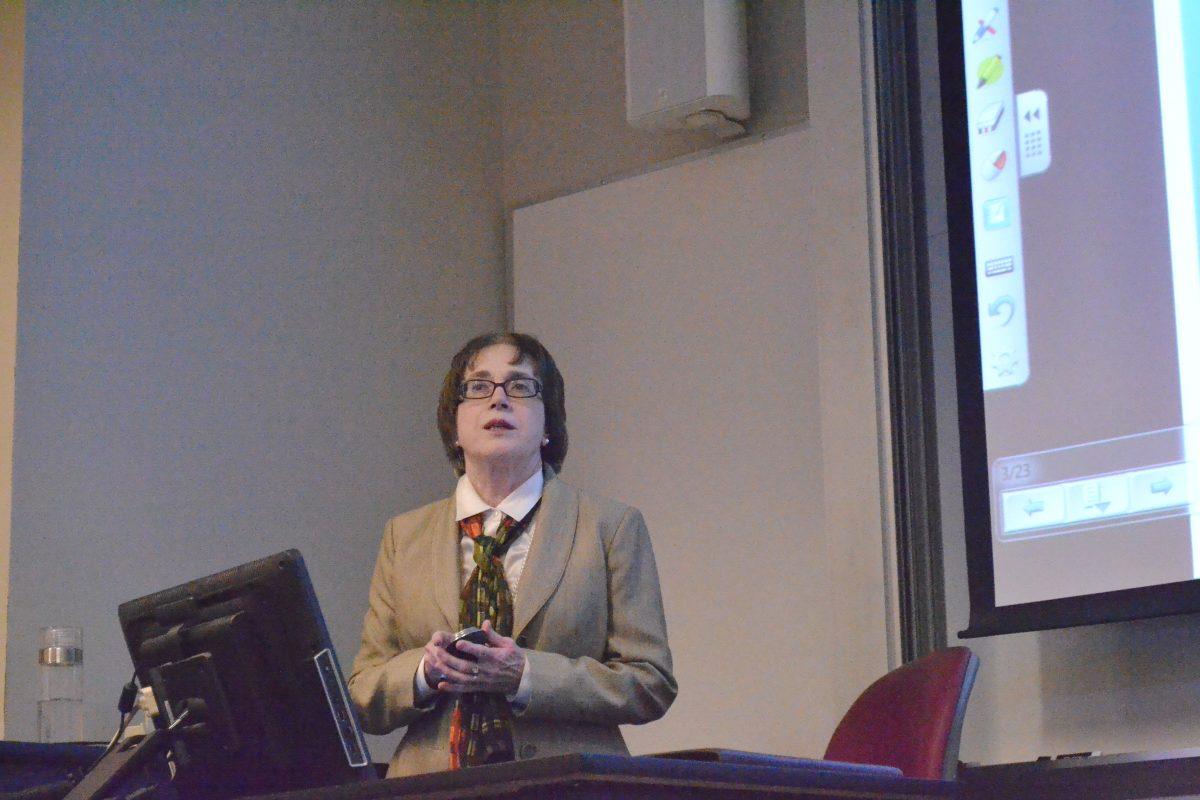If universities are unable to adapt to new technologies, they will eventually have to face the reality of the free market, which could favor a for-profit system, according to Jane Shaw, president of the Pope Center for Higher Educational Policy.
Speaking in Nelson Hall on Tuesday evening, Shaw said the center had found through its studies that “educational quality had gone down,” and that universities are currently facing “turmoil.”
The Society for Politics, Economics and the Law hosted the event as the final part of its semester-long lecture series.
Shaw addressed what she called “disruptive technologies,” comparing the evolution of higher education to the evolution of appliances, where appliance stores such as Sears and other mainstream brands were forsaken in favor of options that were economically viable.
Shaw said the Pope Center is primarily concerned with a lack of value payoff from traditional universities and touted for-profit universities as a viable alternative.
According to Shaw, for-profit universities, including institutions such as Strayer University and the University of Phoenix, have enrolled 10 percent of all college students in the country.
In addressing the shortcomings of for-profit universities, Shaw said there are also plenty of things that are “appalling in traditional universities.”
“Too often now, students are choosing too much of the curriculum that best benefits them and not benefitting the workforce,” Shaw said.
Shaw said she, as well as many other educational experts, were concerned about the lack of rigor in education at many levels.
“We [Pope Center] think that all too often students were able to get away with taking an easier course than one we would have liked,” Shaw said. “Too often when faced with a course such as advanced statistics, students are able to opt for a much softer math course.”
While advocating for more selection in educational options, Shaw said that online education would not be for everyone and that currently it certainly falls behind the value of a traditional education.
“In my personal utopia, we as students would increasingly turn to the internet for routine learning,” Shaw said.
Kyle Ferriter, a sophomore in computer science said that while he agreed with Shaw’s premise that an education can be obtained outside of the University, he said he felt thinking of education directly correlated to a job misidentifies the purpose of it.
“If we treat higher education simply as a means to land a job, then the Internet has already eliminated the need for universities,” Ferriter said.
Ferriter, who is a student in the College of Engineering, said he could easily find 90 percent of the formulas and knowledge he needs through websites such as Khan Academy or Hyperphysics.
“I don’t attend class and spend thousands of dollars a year to get knowledge. I do it to learn how to approach problems and analyze situations from professors who, in most cases, have had to do this in their own lives through research, government agency or commercial projects. Knowing things in a field of study is easy, but being educated in the practice of that field is an entirely different thing.”
Andriy Shymonyak, junior in history and political science, said he was concerned that the commercialization of education as the Pope Center was interested in would result in students becoming objectified and “vessels of information as opposed to students actively engaged in their education.”
The Pope Center garnered controversy with the release of an educational curriculum report at UNC-Chapel Hill.
Last month, the Center released a report detailing with what members of the Center felt were shortcomings with the general education requirements at UNC-Chapel Hill, recommending that the institution reduce available gen-ed classes from more than 4,000 to fewer than 700.
The Center called the general education curriculum at UNC-CH “incoherent” due to the “smorgasbord” or vast variety of classes that did not target skills that would earn the students a job.








